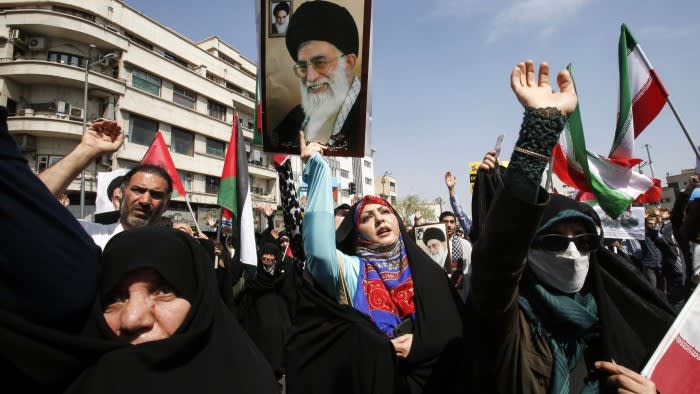
Unlock the Editor’s Digest for free
Roula Khalaf, Editor of the FT, selects her favourite stories in this weekly newsletter.
The writer is president of Queens’ College, Cambridge, and an adviser to Allianz and Gramercy
National security experts and financial market traders seem to disagree on what will follow the recent escalation of tensions between Iran and Israel. The question of who turns out to be correct will have significant consequences not only for an already unstable Middle East but also for the wellbeing of the global economy and the stability of its financial system.
The notion of a “new Middle East” has often come up in the national security camp’s characterisation of what has transpired following Israel’s attack on the Iranian consulate in Syria at the start of this month.
Specifically, multiple lines have been crossed by both parties. For the first time in history, the two countries have attacked each other directly rather than through the use of proxies and targets in third countries. Iran has directed a once-unthinkably large number of missiles and drones at Israel, responding to the Israeli attack in Damascus that killed a number of Iranian senior officials. Friday’s Israeli retaliation came on the heels of an explicit warning from Iran’s foreign minister that it would immediately respond should it be attacked directly.
Despite all this, the markets’ reaction has been relatively tame and contained. Rather than price the market implications of a durable escalation in geopolitical threats and a fatter tail risk of substantially higher oil prices for long, traders have been quick to fade the initial moves in many asset prices.
This includes oil, by far the most sensitive international price, which is today well below where it closed before Iran first retaliated for Israel’s consulate attack. These prices have also failed to maintain their initial move up on the latest news of Israel’s response.
This contrast in market vs expert views could have consequences well beyond regional stability. It relates directly to four themes that the IMF identified this week as important for global economic wellbeing and financial stability: insufficient growth, sticky inflation, the lack of policy flexibility and the pressures associated with greater international divergence in economic outcomes and policy setting.
While the global economy is able to handle a transitory bump, it is already too fragile to handle a large new economic shock. Specifically, a further round of military escalation between Iran and Israel would undermine already low and fragile global growth, push up goods inflation at a time when services inflation is still too high, and impose demands on fiscal and monetary authorities that have already used up much of their policy flexibility and have limited operating space.
Meanwhile, the distribution of this stagflationary shock would amplify the economic and financial divergences that are already imposing some stress on the global order.
First, two of the potential engines of global growth — the already-stressed Chinese and European economies — would be hit relatively hard given their high dependence on imported energy.
Second, US inflation would prove even more stubborn at a time when progress in reducing price pressures has already disappointed this year, thereby acting as a bigger counter to early rate cuts by the Federal Reserve.
Third, the strong dollar would get a further appreciation boost, undermining trade and financial intermediation.
And finally, with worsening economic and geopolitical situations, risk premia would increase. This would lead to higher borrowing costs than might have prevailed otherwise.
Such considerations assume greater urgency when factoring in what did not happen in the most recent tit-for-tat between Iran and Israel.
Whether by design or otherwise, neither party has inflicted considerable human and physical damage on the other. Also, Iran did not materially deploy its regional proxies in what could easily have been a more comprehensive attack on Israel. Meanwhile, Israel did not go after Iranian nuclear sites in its response. It also did not succumb to pressure from its closest allies, most notably the US and UK, for a greater degree of restraint and de-escalation.
All this points to a significant shift in the dynamic between these two countries, Most importantly, this has changed from a relatively stable disequilibrium, in which each party refrained from direct attacks, to a more unpredictable and unstable disequilibrium in which dangerous precedents have been set and each side has more reasons to escalate tensions further.
When comparing the reaction of markets to the views of most national security experts, I am reminded of the story of the frog in boiling water.
There is no doubt that the latest round of Iran-Israel hostilities has crossed many lines and durably raised the geopolitical temperature in the region. Yet markets seem keen to brush this aside, comforted by the fact that we are yet to reach the boiling point of significant human casualties and physical damage in these retaliation rounds — a point that would cause significant economic and financial dislocations. Given that this is a region that is vulnerable to errors of judgment, insufficient understanding of adversaries, and implementation accidents, that could well prove too complacent a reaction.
Read More: World News | Entertainment News | Celeb News
FT









